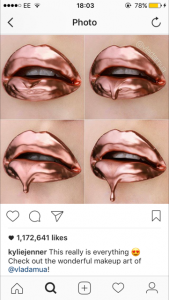I don’t think I can do a blog about materialistic young people if I didn’t talk about one of the main factors that contributes to this – advertising and promotion. People do not realise how much we are exposed to it on a day to day basis, and how much it effects not only our choices but also the way we view things. Young adults have almost constant access to devices and tablets, there is no escaping the amount of advertising they will see everywhere – even a simple hashtag.
Advertising on social media.
Instagram is full of not only popular, but also up and coming companies and brands. It is a prime location to keep fans updated and show off new and exciting products. There are many different ways to advertise, hashtags, competition giveaways and of course promoted posts that you see whilst scrolling through your feed. All of this just adds to the need of wanting those materialistic objects. Didn’t win the competition? Well you may as well just buy it yourself! These small ways of advertising are just constant reminders that we need these products in our lives in order to be happy.
Currently there is a huge trend that consists of bloggers and vloggers aonstantly promoting different brands, with their new ‘go to products’, which bear in mind is different nearly every week – which leads us to believe that they use that product all the time even if they dont. Young people are very influential, if they look up to someone on social media, they will listen and trust what they are saying. If Zoella says

A screenshot of Kylie Jenners Instagram where she is promoting.
a certain moisturiser is amazing (despite its expensive cost) it will almost 100% be considered. Comments such as these are potentially causing young people to have a potentially strong materialistic view of things. With other famous faces such as Kylie Jenner who are constantly promoting their products and other brands, it’s no surprise the younger generation today becoming more and more materialistic. Her Instagram is filled with selfies, products and modelling shots – providing a very unrealistic role model for young girls, yet so many look up to her and her lifestyle.
The hashtag
Smaller brands are now following in the footsteps of the larger brands by using hashtags and promotion to try and get their name out there. A simple photo of an item with the use of a hashtag can inform everyone as to where that product was purchased. There is even a possibility of that photo being featured on their Instagram, which makes it even more appealing. Every time you use that hashtag you are advertising for that company. In a way, you could say that when advertising, they are taking advantage of the vulnerability of young adults today, and their desire to look attractive and fit in with everybody else. When I’m on Instagram I constantly see people promoting teeth whiteners, vitamins to make hair grow longer and other unnecessary products. This is leading us to believe that we need this products if we want to look good, which is the wrong message to send to young people #stopthis.
Missguided
Its not just the advertising on social media that’s the problem, its everywhere. With constant advertising from popular online clothing brands such as Boohoo, Missguided and Pretty Little Thing. I have lost count in the amount of times I’ve been scrolling through a website and saw a Missguided advertisement on the right hand side of the page. Unlike other advertisements, this one had images of clothes that I have looked at on their website previously, of course trying to persuade me to come back and purchase them (to this day I am still clueless as to how they know what I’ve been browsing). The point is, although this is a very clever way of advertising, it is also very sneaky, as what better way to draw you back to their website than to tempt you with the exact products you’ve already considered buying? As the younger generation are so engrossed in the fashion world with bloggers becoming a new voice for young people, this would be a very beneficial way of advertising for the brand.
Young people are being bombarded with the idea that they need purchase certain things in order to fit in, almost saying that they need to fix themselves. Advertising is leading teenagers down a bumpy path, with photo shopped models promoting unrealistic images of the perfect body on their feed. It’s no wonder young people are becoming more materialistic if it’s all they see online.
Thanks for reading!
Holly
Leave a Reply